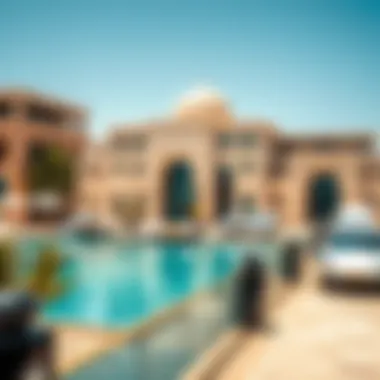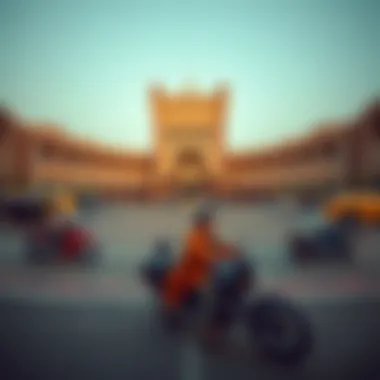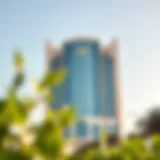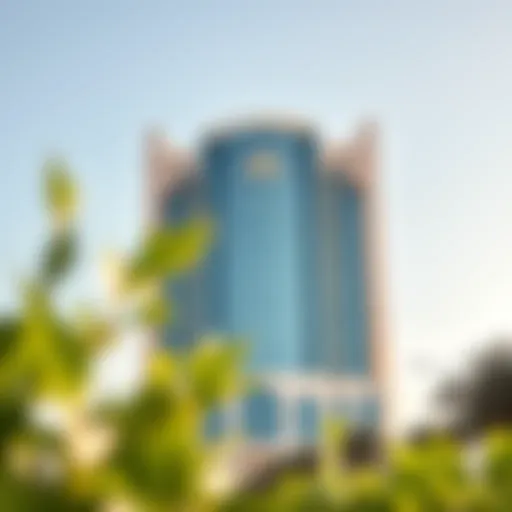Life in Dubai for Foreigners: A Comprehensive Overview


Intro
Dubai, with its shimmering skyline and bustling lifestyle, acts as a crossroads where traditional culture meets modern innovation. For many foreigners, this vibrant city represents a fresh start or a golden opportunity to carve out a niche in a rapidly changing world. Yet, adjusting to life in this cosmopolitan hub is not without its twists and turns. Each expatriate's journey is shaped by unique experiences, influenced by the economic, social, and legal landscapes that govern the city.
Setting the Scene
Upon arrival, one can’t help but notice the melting pot of cultures. People from all walks of life converge in this desert oasis, creating an intricate tapestry of traditions and values. Expatriates can experience the thrill of the global marketplace by interacting with individuals from diverse backgrounds. Yet, amidst this alluring atmosphere, complexities arise regarding housing, work permits, and cultural integration.
Understanding the nuances of living here is crucial for a successful transition. From securing a place to live to navigating the real estate scene, each step demands attention and strategy. Moreover, being aware of local customs and laws can significantly ease the adjustment period. This article serves as a guide to illuminate the multi-layered experience of foreigners in Dubai.
Why It Matters
The relevance of this topic lies not just in the logistics of moving but in understanding how the lifestyle varies dramatically based on one's choices in housing, employment, and social interactions. The expatriate experience can lead to fruitful and rewarding outcomes if one is equipped with the right tools and knowledge. Hence, this exploration goes beyond mere survival; it aims for a thriving existence in a dynamic city.
As we delve deeper into the various facets of life in Dubai, we'll highlight essential insights and practical tips geared towards investors, homeowners, real estate agents, tenants, and developers alike. Embarking on this journey will equip newcomers with the vital information needed to make informed decisions and enjoy life in this incredible locale.
Foreword to Life in Dubai for Foreigners
Relocating to a new city can feel like a double-edged sword, particularly in a vibrant metropolis like Dubai. For many foreigners, the allure is undeniable; a blend of modernity and tradition paints the skyline, among myriad opportunities in business, leisure, and culture. Understanding what life entails for expats in this Gulf city requires diving deeper into various aspects—beyond the surface of dazzling skyscrapers and luxury shopping.
Life in Dubai is not just about enjoying the high life. It balances the comfort of familiar elements with the need to adapt to a new way of living. This essential exploration seeks to underline crucial details that both potential newcomers and established expatriates should ponder. The city’s booming economy continues to attract skilled professionals from all corners of the globe, giving birth to a rich tapestry of cultural diversity. However, the complexities of residency laws, cultural nuances, and lifestyle integrations can present challenges.
Benefits of Living in Dubai for Foreigners
In this city, advantages abound:
- Career Opportunities: Dubai is home to a rapidly expanding job market, especially in sectors like technology, finance, and hospitality. With numerous multinational corporations setting up shop, professionals stand to gain significantly.
- Tax Benefits: One of Dubai's most appealing features is the absence of personal income tax. This financial advantage can help expats save more—an appealing factor for many prospective residents.
- Cultural Exposure: The multicultural nature of Dubai is another selling point. Engaging with various cultures facilitates personal growth and broadens perspectives, setting a diverse social backdrop that enriches everyday experiences.
However, it’s not all rainbows and cupcakes; challenges do exist, like the high cost of living and the zigzagging paths of bureaucratic processes. Navigating legalities for residency and work permits often leaves newcomers scratching their heads.
In exploring life in Dubai, this article doesn't just hover around the superficial elements. It aims to provide insights and procedural steps uncovered through lived experiences, arming readers with actionable knowledge to ease their transition.
A comprehensive approach ensures understanding the significance of cultural diversity, the intricacies of real estate, employment opportunities for foreigners, and even the day-to-day challenges faced by expatriates.
In summary, living in Dubai as a foreigner is a journey filled with opportunities and hurdles. Through this exploration, readers will gather essential tools to navigate their lives, weeding out the vital from the mundane.
"Dubai isn't just a destination; it's a vibrant community where cultures converge and new opportunities flourish."
As potential residents ponder making the leap to Dubai, this article serves as a go-to guide not only to anticipate challenges but also to enjoy the vibrant tapestry of life in this stunning city.
Cultural Diversity in Dubai
Dubai stands as a testament to global integration, with its vibrant cultural diversity being one of its most defining characteristics. In this article, we delve into how this rich tapestry of cultures influences the day-to-day lives of expatriates residing in the city. The cultural milieu in Dubai is not just a backdrop; it plays a pivotal role in shaping personal experiences, social interactions, and even business opportunities.
The Expatriate Community
The expatriate community in Dubai is a microcosm of the world, showcasing a multitude of nationalities, languages, and lifestyles. Over 80% of Dubai's population comprises expatriates, including people from India, Pakistan, the Philippines, the UK, and many other countries. This influx creates a unique melting pot where ideas, traditions, and cuisines collide, enriching the local culture.
Living in such a vibrant community comes with its own challenges and benefits. For new arrivals, it can be both exciting and daunting. On one hand, there is a wealth of opportunity for socializing and networking, as it's relatively easy to connect with people from similar backgrounds. On the other hand, the vast differences in customs and communication styles can lead to misunderstandings. Embracing this diversity is crucial for a harmonious life in Dubai.
Cultural Festivals and Events
Cultural festivities in Dubai provide a window into the traditions of its diverse populace. Events like the Dubai Shopping Festival or Dubai Food Festival attract visitors and expatriates alike, offering a glimpse into various cultures through food, art, and entertainment. The celebration of Eid al-Fitr and Diwali are significant, showcasing the importance of these long-standing traditions to their respective communities.
These events often serve as a platform for showcasing multiculturalism. A foreigner could easily find themselves enjoying an Indian dance performance one night and savoring authentic Emirati cuisine the next. The beauty of these festivals lies in their ability to foster understanding and appreciation among different cultures, reflecting the essence of coexistence in Dubai.
Social Etiquette for Foreigners
When navigating through Dubai, understanding social customs can ease the transition for foreigners. While Dubai is more liberal compared to other parts of the UAE, it's essential to remain respectful of local traditions and social norms.
- Dressing Appropriately: While Western-style clothing is common, modest attire is encouraged, especially in shopping malls or religious sites.
- Public Behavior: Displays of affection, like kissing or holding hands, should be approached with caution, as they may not be received well in all circles.
- Dining Practices: If invited to a local home, it is customary to remove your shoes and refrain from discussing politics or religion until more familiar with the host.
Understanding these practices fosters goodwill and helps cultivate deeper relationships within the community.
For foreigners moving to Dubai, adapting to cultural nuances is not just beneficial—it's essential in establishing meaningful connections.
Navigating cultural diversity in Dubai is akin to walking through a vibrant canvas, filled with colors, sounds, and tastes from around the globe. The ability to embrace and appreciate this diversity can significantly enhance one's experience of living in this dynamic city.
Navigating the Real Estate Market
When moving to a new city, especially one as vibrant and bustling as Dubai, understanding the real estate market becomes paramount. This section aims to equip foreigners with the knowledge they need to make informed decisions about housing, an integral part of settling down. Getting a grasp on property options, the rental landscape, and the neighborhoods that cater to expats facilitates easier navigation through the sometimes complex process of finding a home.
Understanding Property Ownership
In Dubai, property ownership can be deceptively straightforward at first glance, yet there are nuances worth delving into. Foreigners can purchase property in designated areas, often referred to as freehold regions. This categorization allows expats ownership rights similar to locals in areas like Dubai Marina and Downtown Dubai. It's essential for prospective buyers to understand the difference between freehold and leasehold properties, as it greatly affects investment potential.
Consider these key points:
- Freehold properties: This category grants full ownership and the buyer can sell, rent, or modify the property as they see fit.
- Leasehold properties: In this case, individuals obtain a property for a set period, usually 99 years, after which ownership reverts back to the landowner.
- Government regulations: The UAE's government has instituted various laws to protect both foreign investors and local sellers, which is crucial to know before committing to a significant purchase.
To sum it up, understanding the types of property ownership available in Dubai is the first step in navigating its real estate landscape effectively.


Renting vs. Buying in Dubai
Making the decision to rent or buy a home in Dubai involves weighing several factors. Renting typically appeals to expatriates who prioritize flexibility. Rent prices can vary enormously based on location, size, and amenities. In areas like Jumeirah or Palm Jumeirah, the prices can skyrocket, while neighborhoods further from the city center, like Dubai Sports City, may offer more affordable options.
- Pros of renting:
- Cons of renting:
- Flexibility to relocate without the burden of selling a property.
- Lower upfront costs compared to buying, which involves hefty down payments and additional fees.
- Access to luxurious amenities in many rental properties, such as gyms, pools, and 24/7 security.
- Lack of equity building; rent payments do not contribute to asset growth.
- As rentals often require annual contracts, sudden changes in the market may leave renters scrambling if prices rise significantly.
On the other hand, buying a home in Dubai can be a wise investment in the long run, especially as property values trend upward in several areas. Simply put, whether renting or buying, the decision is highly personal and should align with one's long-term goals and financial situation.
Popular Residential Areas for Expats
Choosing the right neighborhood can significantly affect a foreigner's experience in Dubai. Some areas are particularly popular among expats, offering a blend of community vibe, accessibility, and amenities. Here are a few:
- Dubai Marina: Known for its modern high-rises and waterfront views, this area is popular among younger professionals. Easy access to the beach and a vibrant nightlife add to its appeal.
- Jumeirah Beach Residence (JBR): This destination combines resort-style living with a bustling atmosphere, where expats flock for the beach and leisure options.
- Downtown Dubai: Home to iconic structures like the Burj Khalifa and Dubai Mall, this area offers an urban lifestyle that attracts many new arrivals.
- Arabian Ranches: For families, this villa community provides spacious homes, parks, and schools, creating a family-friendly environment that many expatriates cherish.
In summary, familiarizing oneself with the popular residential areas in Dubai can save time and enhance the overall settling-in experience.
"Understanding the real estate dynamic is not just about finding a home. It’s about integrating into Dubai’s culture while making a sound investment."
For further insights, visit resources such as Dubai Land Department or Gulf News Real Estate Section to stay updated on market trends.
Employment Opportunities for Foreigners
In the context of expatriate life in Dubai, employment opportunities hold significant sway over daily experiences and overall satisfaction. With a thriving economy that attracts numerous multinational companies, the job market in Dubai offers numerous avenues for foreigners. These opportunities are not just about financial gain but also about personal and professional growth, considering the city's unique work culture and lifestyle.
For many newcomers, landing a job in Dubai is a first step towards building a successful life in a new country. However, understanding the dynamics of the job market and the various components of employment that come into play is crucial to making an informed decision.
Job Market Overview
Young professionals, seasoned executives, and skilled laborers all find a place in Dubai's diverse job market. The city has become a hotspot for sectors such as tourism, technology, finance, and healthcare. In recent years, the demand for tech-savvy professionals has surged, especially in fields like software development and data analysis.
Employment statistics indicate that the city consistently ranks as a desirable place for expatriates searching for work. According to recent reports, a significant percentage of the workforce is composed of foreigners, reflecting the global nature of the economy. Additionally, the annual World Economic Forum analyzes job prospects, whereby Dubai frequently earns high marks for opportunities available to skilled workers.
To sum up, the overall health of Dubai’s job market can be attributed to:
- A robust economy
- Low unemployment rate
- Government incentives for foreign investment
Work Visa Regulations
Navigating the Emirati work visa landscape can be daunting yet is crucial for those seeking employment. The work visa process involves several steps driven by regulations set forth by the Ministry of Human Resources and Emiratisation. There are various types of visas available, depending on the employment needs and the applicant's home country.
All foreign workers must ensure they have a valid offer from a local employer before applying for a work visa. Generally, employers act as sponsors, which means much of the paperwork falls on their shoulders, facilitating a smoother process for employees. A key item to note is the medical examination requirement, which is needed for all work visa applicants.
In essence, the critical components of the work visa regulations include:
- Employment offer from a Dubai-based employer
- Medical evaluation
- Background verification
- Residence and work permits
Ignorance of these requirements can lead to complications, so potential expatriates should arm themselves with knowledge and avoid pitfalls.
Networking and Professional Growth
Once you’re in the job market, establishing a solid network can change the game. The expatriate community in Dubai presents vast networking opportunities, with professional groups and events tailored to various industries. Whether it's through platforms like LinkedIn or attendance at trade conferences, connections are vital in Dubai’s competitive landscape.
Moreover, organizations like Meetup often host networking events, allowing newcomers to meet key figures in their field. Engaging in these events gives an edge when exploring career advancements or transitions into new roles. A strong network might lead to mentorship opportunities or even job referrals—an invaluable resource in a city where many positions are filled through recommendations.
In summary, thriving professionally in Dubai relies on:
- Building relationships with other professionals
- Attending industry-related events
- Actively seeking mentorship and guidance
This dynamic setting facilitates continuous professional growth, catering to both individual aspirations and collective advancement. Ultimately, understanding and tapping into these employment opportunities significantly shape the future for foreigners in Dubai.
Everyday Life in Dubai
Understanding everyday life in Dubai is crucial for expatriates as it sheds light on their daily experiences and challenges in this bustling metropolis. The city offers a unique blend of modern conveniences, diverse cultures, and traditional elements. Grasping the nuances of daily living can significantly enhance an expat's comfort, allowing them to thrive in their new environment. Knowing key aspects such as cost of living, transportation, and healthcare services can make the transition smoother and more enjoyable.
Cost of Living Comparison
Cost of living is often a primary concern for newcomers. In Dubai, it can be both a blessing and a curse, depending on various factors. Housing, for example, can range from affordable to extravagant. Renting a modest one-bedroom apartment in Jumeirah can set you back about AED 70,000 annually, whereas opting for a lavish villa might easily cross AED 300,000.
"Living in Dubai can feel like you’re either swimming with the big fish or struggling against the tide—finding your balance is key."
Food costs vary widely too. Dining out at a mid-range restaurant for a meal can cost around AED 100, while street food can be a more economical choice, often under AED 25. Additionally, groceries can add up quickly; local fruits may be cheaper, but imported goods can inflate your monthly budget. It's prudent for expats to budget carefully and adjust their expectations regarding lifestyle.
Transportation and Commuting
Navigating Dubai is both convenient and varied. The Dubai Metro stands out as an efficient way to sidestep traffic headaches, connecting various areas of the city. A single journey ticket costs around AED 4, making it accessible for daily commutes. Most expats find public transportation to be reliable; however, owning a car is also quite popular, given that Dubai is known for its expansive road network.
Traffic can be a thorn in the side, especially during peak hours. Considering alternatives such as taxis or ride-sharing services like Careem and Uber can ease the strain. Public buses also serve many areas, making commuting a breeze. For those leaning towards fitness, cycling is becoming increasingly viable, thanks to dedicated lanes cropping up across the city.


Healthcare Services
When it comes to healthcare, Dubai boasts a robust system that caters well to its diverse population. Expats tend to benefit from high-quality medical services, with both private and public facilities available. Public hospitals are often well-equipped, but many foreigners lean towards private clinics for quicker access and specialized services.
Insurance becomes a key player here. Many employers provide health insurance, which can ease the financial burden. If you're footing the bill yourself, being aware of the costs associated with consultations and treatments is vital. A basic consultation can set you back AED 300 to 500, depending on the specialist’s reputation. Making sure you have adequate coverage can save a lot of dollar signs down the road.
Living in Dubai means embracing its unique blend of modernity and tradition, with each day presenting new experiences. As expatriates navigate their daily lives, understanding these key aspects can greatly aid in adapting to their new home.
Legal Considerations for Foreign Residents
Understanding the legal landscape in Dubai is crucial for foreigners looking to reside in the city. The various laws and regulations can seem convoluted at first, but grasping these can significantly ease the transition into life in this vibrant metropolis. Knowledge of residency permits, local laws, and access to legal help empowers expatriates, ensuring that they can navigate their new environment with confidence and security. This section provides insights into these vital aspects, helping expats reduce potential legal pitfalls and enabling a smoother integration into the community.
Residency Permits and Requirements
When relocating to Dubai, one of the first steps is understanding the residency permit process. The United Arab Emirates operates under a sponsorship system, meaning that foreign residents typically require a local sponsor to secure a residency visa. This sponsor can be an employer or, in certain cases, a family member. It's imperative for newcomers to gather the necessary documentation—such as a valid passport, medical fitness certificate, and possibly a police clearance certificate—before applying for their residency.
There are various types of residency visas available, depending on employment status, investment, or family ties. For instance, an employment visa is usually tied to your job, while a long-term investor visa provides more flexibility for those looking to make significant financial commitments in the region. Additionally, the UAE government has also introduced a remote work visa for digital nomads looking to blend lifestyle with work.
Here’s a simplified checklist for residency visa applications:
- Valid passport
- Medical fitness certificate
- Visa application form
- Passport-sized photographs
- Sponsorship letter (from employer or family)
- Other relevant documents specific to visa type
Understanding Local Laws
Understanding the local laws in Dubai is vital to harmonious living. The UAE's legal framework is unique, rooted in Islamic law (Sharia) and shaped by several civil laws. For foreign residents, this means familiarizing themselves with regulations surrounding matters such as alcohol consumption, public behavior, and business operations.
For instance, while alcohol is widely available in licensed venues such as hotels and clubs, public drunkenness can lead to serious legal issues. Similarly, maintaining respectful behavior in public spaces is essential. Simple gestures, like dressing modestly or avoiding inflammatory language, can prevent unnecessary legal troubles.
The legal structure is often perceived as strict, but it also offers protections for expatriates. Employment laws govern aspects such as contracts, salaries, and termination—ensuring that foreign workers have certain rights in the workplace. An understanding of these laws goes a long way in fostering positive employment relations and ensuring a secure living environment.
Access to Legal Help
When faced with legal challenges or uncertainties, it's important for residents to know where to seek help. Dubai has a plethora of legal services available to foreigners. Engaging a reputable lawyer can prove invaluable, particularly for those needing assistance with complex matters such as property disputes or residency renewal issues.
Free legal aid is offered through certain NGOs and community organizations, which can be a resourceful path for newcomers contending with affordability concerns. Utilizing online platforms can also help; websites such as Lamido and Reddit’s shared experiences often provide insights and reviews of various legal professionals operating in the Dubai region.
"It is always better to be proactive and familiar with the law rather than reactive when issues arise. Build relationships with local resources and networks that can provide guidance on legal matters."
In summary, navigating the legal landscape of Dubai requires diligence and awareness. Being proactive about understanding residency requirements, local laws, and knowing where to find legal support can pave the way for a more seamless and enjoyable expatriate experience.
Education and Childcare Options
Navigating the educational landscape in Dubai is a crucial element for expatriate families considering a move to this vibrant city. The choice of schools and childcare services can significantly impact the overall well-being and integration of foreign residents. Education in Dubai is not only about academic learning; it's also about cultural exposure, social integration, and preparing the next generation for a globalized world. Thus, understanding the available options becomes vital for families.
International Schools Overview
Dubai's education system is unique, characterized by an impressive array of international schools that cater to diverse nationalities. These institutions offer a variety of curricula, including British, American, IB (International Baccalaureate), and others. Notably, the educational standards are quite high, and many schools boast modern facilities and experienced teachers.
The Dubai British School, for instance, provides the National Curriculum of England, emphasizing both academics and personal development. In contrast, American School of Dubai follows an American curriculum and focuses on critical thinking and creative expression. On the other hand, the International School of Arts and Sciences offers an IB curriculum that encourages a holistic approach to learning.
Parents can expect tuition fees ranging from moderate to steep, often reflecting the school's reputation and offerings. Typically, fees can range from AED 30,000 to AED 100,000 per year. It's wise for families to start early in researching schools, as waiting lists can be long, especially for sought-after institutions.
Childcare Services and Costs
For parents with younger children, childcare services are a primary concern. Dubai offers a range of nurseries and daycare options, catering to infants and toddlers. Most of these services emphasize a safe and nurturing environment, tailored to the developmental needs of children.
Facilities like Child's Play or The Wonder Years focus on creative play and early childhood development, employing trained staff and a range of activities aimed at stimulating young minds. Annual fees for childcare can vary widely, with many costing around AED 25,000 to AED 60,000. Before selecting a facility, parents should consider factors such as the child-to-staff ratio, location, and curriculum.
"Education is not preparation for life; education is life itself."
- John Dewey
Extracurricular Activities for Youth
Extracurricular activities play an essential role in a child's development, particularly in an international context like Dubai. These activities help children forge friendships, explore interests, and develop skills outside of the traditional classroom. Schools often offer a wide array of extracurricular options, including sports, arts, and technology clubs.
For instance, Dubai International Academy is known for its extensive sports programs such as football and swimming, while Jumeirah English Speaking School hosts art and drama clubs. Beyond school offerings, Dubai is home to external organizations like Dubai Sports Council, providing various training programs and competitions for youth.
Participation in these activities not only aids in social integration for expatriate youth but also enhances college readiness, as many universities worldwide look favorably upon applicants with well-rounded experiences. Costs for extracurricular activities can differ widely, generally starting from AED 1,000 to AED 5,000 per term, depending on the program.
Safety and Security in Dubai
Dubai, known for its towering skyscrapers and opulent lifestyle, is often touted as one of the safest cities in the world. The stability of this metropolis is it’s one of the main draws for expatriates looking to settle in the region. Understanding the nuances of safety and security in Dubai not only enhances the experience for foreigners but also instills a sense of confidence about living and working in this dynamic environment.
Crime Rates and Perception
When talking about crime, Dubai stands out with its impressively low crime rate. In recent years, the city has been recognized for its strong law enforcement and community safety initiatives. Recent statistics indicate that violent crime is virtually non-existent, effectively painting a picture of a city where personal safety is rarely a concern.
However, it's important to be aware of specific petty crimes that do occur, like pickpocketing, particularly in crowded areas and tourist hotspots like the Dubai Mall or the Gold Souk. Among the local population, the perception of safety is robust; many expats will share stories of walking the streets late at night without fear. That said, continually being aware of your surroundings is a wise practice.
Emergency Services Overview


Emergency services in Dubai are highly efficient and accessible. The city has a well-structured system in place, including ambulance services, police, and fire departments that operate around the clock. Calling for help is as simple as dialing 999 for police, 998 for ambulance, and 997 for fire. Dispatchers typically speak English, which eases communication for foreign residents.
Furthermore, Dubai's healthcare system is among the best worldwide. The hospitals are equipped with state-of-the-art facilities, ensuring that any medical emergencies are handled swiftly and effectively. The integration of technology into emergency services further enhances their responsiveness, with smart apps available for reporting incidents quickly and efficiently.
Tips for Staying Safe
While Dubai has a reputation for safety, it is essential to remain vigilant. Here are some practical tips for expatriates:
- Keep your belongings close, especially in crowded places.
- Be aware of your surroundings, particularly in unfamiliar areas.
- Use reputable transport services, such as taxis or ride-sharing apps like Uber.
- Familiarize yourself with local emergency contact numbers.
- Respect local customs and laws, which can avoid unwanted attention.
"Staying aware and informed can significantly enhance your safety while living in Dubai."
By adopting these simple safety measures, expatriates can enjoy their time in Dubai, immersed in its vibrant culture without unnecessary concern for personal safety. Ultimately, the city has cultivated an environment where safety is a priority, allowing newcomers to thrive as they adapt to their new home.
Religious and Social Practices
Understanding the religious and social practices in Dubai is paramount for foreigners navigating this vibrant city. Dubai, while modern and cosmopolitan, is deeply rooted in Islamic traditions which greatly influence everyday life. Engaging with these practices can offer not only respect for the local culture but also improve interpersonal relations and integration within the community.
Islam and Its Influence on Daily Life
Islam is not just a religion in Dubai; it’s woven into the very fabric of daily life. From the moment one wakes up until the end of the day, the call to prayer resonates throughout the city. This five-times-daily ritual serves as a reminder of faith, discipline, and community for both residents and expatriates.
Many aspects of daily life reflect Islamic values, including the prohibition of alcohol in many public places, particularly during the month of Ramadan when fasting is observed from dawn to dusk. Foreigners might find it crucial to understand that during this holy month, not only do Muslims fast, but the entire community respects these observances. Many restaurants might have reduced hours or even close during daytime hours to honor this tradition. Recognizing and respecting such practices can foster goodwill in social interactions.
"Respecting local customs is akin to building a bridge between cultures."
Public Holidays and Observances
Dubai celebrates several public holidays that are significant to its Islamic heritage and nationality. Eid al-Fitr and Eid al-Adha are two notable occasions, marking the end of Ramadan and commemorating the willingness of Ibrahim to sacrifice his son, respectively. On these days, public celebrations are quite lively, with families gathering for feasts, prayers, and community festivities.
Another crucial day is the UAE National Day, celebrated on December 2nd. It marks the union of the seven emirates and is a time for patriotic display, fireworks, and various parades. Holidays such as these can serve as a wonderful opportunity for expatriates to connect with local traditions and partake in celebrations, enhancing their immersion in UAE culture.
Navigating Religious Sensitivities
Navigating religious sensitivities in Dubai requires a mix of awareness and respect. The Emirati culture is generally welcoming to foreigners, yet comes with its boundaries. For instance, modest attire is encouraged, particularly in religious sites like mosques. Understanding appropriate behavior, such as greeting people respectfully and avoiding public displays of affection, can significantly aid in building positive relationships.
Moreover, when attending local festivals or gatherings, being mindful of the customs—like waiting for the host's cue to start eating—can reflect a genuine appreciation for the local culture. Taking the time to learn a few Arabic phrases can also bridge cultural gaps and foster inclusivity in conversations.
In summary, the religious and social practices present in Dubai shape the environment in which expatriates live and interact. An understanding of these practices is not just beneficial; it’s essential for anyone wishing to truly engage with the local community while residing in this unique metropolis.
Engaging with Local Culture
For expatriates in Dubai, immersing oneself in the local culture is not just a matter of social etiquette; it’s a pathway to enhancing the overall living experience. Understanding and appreciating the nuances of Emirati culture can open doors, promote community ties, and help foreigners navigate daily interactions more amicably. Moreover, engaging with local culture fosters mutual respect and understanding between expats and Emiratis, which is crucial in a city famous for its diverse expatriate population.
Dining Options and Culinary Experiences
When it comes to food, Dubai is nothing short of a gastronomic paradise. The culinary scene is a beautiful tapestry woven together by various cultures. From traditional Emirati dishes like al harees and shawarma to international cuisine that ranges from Indian to Mediterranean, there’s a bit of everything for everyone.
Dining isn’t just about filling one’s stomach; it serves as a cultural bridge. Restaurants like Al Fanar offer an authentic taste of UAE’s heritage, allowing diners to experience how the locals savor their meals. Eating at communal tables or sharing platters are not just dining practices; they signify hospitality and warmth, core Emirati values. So, whether trying out cafes at Dubai Marina or indulging in street food at Al Karama, it’s recommended to engage with the people around you and perhaps even initiate a conversation about the dish you’re trying. This approach not only enriches your dining experience but also fosters social connections.
Arts, Music, and Entertainment
Dubai's cultural landscape is vibrant and eclectic, reflecting its status as a melting pot of expatriates. The art scene here is booming, with the Dubai Art Fair attracting local and international artists alike. Galleries in Alserkal Avenue showcase contemporary art, while cultural institutions like the Dubai Opera host a variety of performances from classical concerts to pop music shows.
Moreover, the incorporation of art into public spaces, like the Dubai Design District, shows the city’s commitment to fostering creative expressions. It’s worth noting that attending local concerts or art exhibitions not only entertains but gives insights into the cultural sentiments and societal narratives that shape Dubai as a modern metropolis. Plus, engaging in these events often brings people together, offering the opportunity to meet fellow art lovers and perhaps discover a shared interest.
Sports and Recreation Activities
Sports in Dubai carry a unique flair, reflecting its multicultural makeup. From world-class facilities like the Dubai Sports City to outdoor adventures like dune bashing in the desert, there’s something for everyone. Expats have the chance to participate in a range of activities—be it golf, cricket, or even paddleboarding along the Jumeirah Beach.
Cultural and traditional sports such as falconry and camel racing provide insight into the region’s heritage and are often showcased at local festivals. Participating in or attending these events can grant foreigners a glimpse into the local way of life, forging a deeper connection with the community.
By engaging in these diverse cultural experiences, foreigners not only enrich their own lives in Dubai but also contribute to the vibrancy of the city, helping to create a community where everyone—locals and expats—can feel at home.
Finale on Living in Dubai as a Foreigner
Living in Dubai as a foreigner presents a blend of opportunities and challenges. As more individuals from diverse backgrounds flock to this desert city, it's crucial to understand what it truly means to call Dubai home, even temporarily. The conclusion wraps up the various threads of information presented throughout the article, emphasizing how crucial it is to grasp these nuances for a fulfilling expatriate experience.
Why Understanding the Expatriate Experience Matters
A well-rounded grasp of life in Dubai empowers newcomers. This goes beyond mere survival in a new environment; it involves thriving within it. Understanding cultural sensitivities, legal responsibilities, and social norms allows expatriates to foster deeper connections with locals and other expatriates alike. Navigating daily interactions becomes smoother and more meaningful.
The diversity of backgrounds amongst foreigners creates a vibrant tapestry that enriches the community. With a mix of languages, traditions, and experiences, building relationships often enhances personal and professional growth. This culture of inclusivity can lead to collaborations and partnerships that are rewarding on many levels.
Key Takeaways for Potential Expatriates
- Cultural Sensitivity Is Key: Recognizing and respecting Emirati customs can make a big difference in daily interactions. Understanding local laws and practices is paramount.
- Legal Framework to Navigate: Foreigners must familiarize themselves with visa regulations, residency permits, and their rights under local law. Ignorance of regulations can result in complications that are easily avoided with proper knowledge.
- Real Estate Landscape: From high-rises to villa communities, knowing the real estate dynamics can help in making informed decisions, whether renting or buying. This includes understanding market trends and popular neighborhoods.
- Networking Opportunities: Dubai's dynamic economic landscape opens doors. Engaging in professional networks enhances job prospects and eases the path for newcomers, providing a sense of community.
"In the heart of Dubai, one can find a blend of old traditions and modern innovation, making it essential for newcomers to embrace both aspects to fully enjoy their stay."
Benefits of Comprehension and Preparation
Taking time to understand the intricacies of life in Dubai helps mitigate the potential pitfalls many newcomers face. For investors and homeowners, the knowledge of local real estate dynamics is particularly vital. It enables them to identify lucrative opportunities that may not be immediately apparent to the untrained eye. Additionally, for those simply looking to rent, being aware of current market rates can save a good deal of money.
However, it’s not solely about economic factors. The social and personal dimensions of living in Dubai can't be overlooked. An informed foreigner has better chances of navigating through the trappings of daily life, thereby ensuring a greater sense of belonging and satisfaction in their new home.
In summary, delving into the nuances of living in Dubai as a foreigner is more than just an intellectual exercise; it’s a necessity for anyone looking to maximize their experience in this unique metropolis. A thoughtful approach to understanding the many layers of life here ultimately leads to a richer, more fulfilling expatriate journey.













